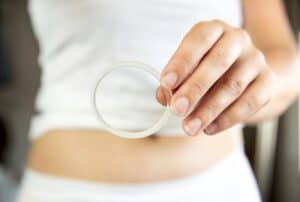Medically reviewed by Catherine Hansen, MD, OBGYN & Menopause specialist
Perimenopause is a natural phase of transition that women experience before reaching menopause. It is characterized by hormonal fluctuations, which can lead to a variety of physical and emotional changes. Navigating the waters of perimenopause and menopause can feel like charting unknown territory. One of the key changes you might encounter is vaginal dryness, a common symptom that many women face. Understanding and managing this symptom is crucial for maintaining your quality of life during menopause and perimenopause.
Vaginal dryness is more than just dryness. The term refers to a lack of moisture and lubrication in the vaginal area, which can cause discomfort, itching, and pain during intercourse. It can also lead to an increase in urinary tract infections (UTIs). This condition can significantly impact a woman’s sexual health and overall well-being. It can result in reduced sexual desire, pain during sex, and even feelings of shame, inadequacy, embarrassment or frustration.
This dryness is caused by the changing hormones in your body and won’t ease up on its own. As estrogen decreases, the tissues that rely on it become more delicate. However, dryness and other vaginal dryness is easily treatable. Seeking appropriate treatment can alleviate your symptoms and improve your overall well-being.
Vaginal Estrogen: What Is It and How Does It Work?
Vaginal estrogen is a highly effective form of hormone therapy specifically designed to address the common symptoms of vaginal dryness experienced during perimenopause. As you enter this transitional phase, estrogen levels naturally decline, resulting in significant changes in the vaginal tissue. These changes include decreased moisture and elasticity, which can lead to discomfort and diminished sexual satisfaction and function.
By replenishing the estrogen in your vaginal tissues, vaginal estrogen provides a targeted solution to restore moisture, improve elasticity, and alleviate the bothersome symptoms of dryness. By doing so, it enhances overall comfort and pleasure during sexual intercourse and reduces the risk of vaginal tears and irritation that may occur due to the lack of lubrication.
Furthermore, vaginal estrogen offers additional benefits by protecting against vulvovaginal atrophy, a condition characterized by the thinning, inflammation, and decreased elasticity of the vaginal tissues. By promoting the restoration of moisture and the rejuvenation of the vaginal tissues, it helps alleviate the discomfort and irritation associated with this condition, enhancing overall vaginal health and well-being.
Estrogen cream for vaginal dryness
Designed to provide comfort and lubrication, estrogen cream can help alleviate the discomfort associated with vaginal dryness. By applying the cream directly to the affected area, it helps to heal the tissue layers, replenish moisture and restore the natural lubrication that may be lacking. Unlike other forms of estrogen therapy, such as pills or patches, creams allow for localized treatment and minimal systemic absorption. This targeted approach can provide relief specifically where it is needed, without affecting the rest of the body. It also means vaginal estrogen cream can be a treatment option for women who cannot have systemic hormone therapy.
Additionally, estrogen cream is generally well-tolerated and easy to use, making it a convenient choice for many individuals experiencing vaginal dryness. Always consult with a doctor to determine if estrogen cream is the right option for you. Here at Pandia Health, we have expert doctors that can help you find if estrogen cream (Premarin or Estrace) is the right treatment for you and write a prescription for it. Check out our perimenopause and menopause treatment service!
Vaginal Estrogen Options
Aside from estrogen cream, there are other forms of vaginal estrogen available for the treatment of vaginal dryness during perimenopause. All of them are valuable but there are some that may be more or less effective.
Because there are so many options, you’re likely to find that one of the forms of vaginal estrogen may be a good option for you, if you’re having symptoms that it treats. There are treatment methods for every lifestyle and concern related to vaginal dryness.
Vaginal estrogen ring
Vaginal estrogen rings offer a unique advantage of continuous estrogen release. These flexible rings are inserted into the vagina, where they gradually release estrogen over a specified period. This eliminates the need for daily or weekly applications, providing a hassle-free solution for those seeking long-lasting relief from vaginal dryness.
The Vaginal estrogen ring used in the US is Estring and a prescription is needed. Estring lasts 90 days and can be left in during sex (or taken out and replaced later). If you feel this might be a good solution to your own vaginal discomfort, consult with a doctor to weigh the benefits and risk of this medication.
Vaginal estrogen tablets
Vaginal estrogen tablets are a localized treatment option, meaning they primarily target the vaginal tissues and have minimal systemic effects. This is not an oral tablet. These tablets are typically inserted into the vagina using an applicator and dissolve slowly, releasing estrogen over time. It is important to follow the instructions provided by your healthcare provider for proper use and dosing. This controlled release mechanism ensures a steady and consistent supply of estrogen to the vaginal tissues, promoting moisture and alleviating dryness.
Vaginal estrogen tablets are typically inserted just twice a week, making them relatively convenient. Some common brands of vaginal estrogen tablets brands are Vagifem and Yuvafem. As with all types of medication, you will need to consult with a doctor to see if this is a good fit for you and get a prescription for it. At Pandia Health, our doctors are experts in menopause and can help you to find out if vaginal estrogen tablets are an appropriate choice to help ease your perimenopausal symptoms. Sign up for a consultation today!
Selective estrogen receptor modulator (SERM)
Osphena is a unique non-hormonal option that is taken by mouth in an oral pill but specifically targets the vulvovaginal tissues to treat vaginal atrophy and painful intercourse in post-menopausal women.
With all options presented, you will need to talk to a doctor to see which medication is best tailored to your situation and request a prescription for it.
Vaginal moisturizer
Over-the-counter vaginal moisturizers are another treatment option for vaginal dryness during menopause. These products are designed to provide long-lasting relief by moisturizing the vaginal tissues and improving lubrication. Is a good option for those women that don’t want any hormones in their vagina. Because these are an OTC product, a prescription from a doctor is not required so you can try one out fairly easily. But be prepared: These can take several months before you experience full benefits, and the products must be used according to the directions on the package. In the US, the most popular vaginal moisturizer is Replens.
Oral estrogen pill
ral Estrogen pills contain a higher dose of estrogen compared to vaginal estrogen tablets and work by increasing estrogen levels throughout the body, including the vaginal tissues. Unlike vaginal estrogen tablets, oral estrogen pills are a systemic treatment option. This means that the estrogen is absorbed into the bloodstream and affects tissues throughout the body, not just the vaginal tissues. These can be beneficial for you if you’re managing other menopause symptoms, such as hot flashes and night sweats, but it may also increase the risk of potential side effects.
Benefits of Vaginal Estrogen
Vaginal estrogen offers numerous benefits in the treatment of vaginal dryness during perimenopause. By restoring moisture and lubrication to the vaginal tissue, it not only improves vaginal lubrication but also helps to make sexual intercourse more comfortable and enjoyable. The relief provided by vaginal estrogen extends beyond lubrication, effectively reducing discomfort, itching, and pain during intercourse, thereby enhancing overall sexual satisfaction and intimacy.
Moreover, vaginal estrogen can alleviate the tissue changes that create the symptoms of vulvovaginal atrophy. This condition, also known as genitourinary syndrome of menopause (GUSM or GSM) is characterized by burning, irritation, and urinary symptoms that can significantly impact a woman’s quality of life. By targeting the affected area directly, vaginal estrogen acts as a localized treatment option that actually restores aging tissues.
Vaginal estrogen acts primarily on the vaginal tissues without significantly affecting the rest of the body. This localized action leads to lower systemic absorption of estrogen compared with systemic hormone therapy, thereby reducing the risk of potential side effects. It’s also somewhat less complex than systemic hormone therapy; for women with a uterus, taking oral systemic menopausal hormone treatment means taking a progestin to protect the uterine lining, however, vaginal applications do not require the progestin in women who have not had a hysterectomy.
Overall, vaginal estrogen is widely considered a safe and effective treatment for vaginal dryness and GSM during perimenopause, offering women much-needed relief from discomfort and improving their overall well-being.
Vaginal Estrogen’s Potential Risks and Side Effects
While vaginal estrogen is generally considered safe and effective, it is essential to be aware of potential risks and side effects. One concern is the risk of endometrial hyperplasia, especially when estrogen is used without progesterone in women who still have a uterus. However, the risk of endometrial hyperplasia with vaginal estrogen is significantly lower compared to systemic estrogen therapy. Another concern is the potential link between estrogen therapy and breast cancer. It is important to note that the evidence regarding this link is inconclusive, and the risks may vary depending on factors such as age, overall health, personal or family cancer risk and duration of use.
It is worth noting that the risks and side effects of vaginal estrogen can vary from person to person. Factors such as age, overall health, and duration of use can influence your response to treatment. Regular monitoring and open communication with your healthcare provider are important to ensure the appropriate use of vaginal estrogen and to address any potential concerns that may arise.
In summary, while vaginal estrogen is a commonly prescribed treatment option, it is important to have a comprehensive understanding of the potential risks and side effects. By discussing these aspects with your healthcare provider, you can make informed decisions about your healthcare and ensure the safe and effective use of this treatment.
Takeaway
Vaginal dryness and painful intercourse during perimenopause can be a frustrating and uncomfortable symptom, but there is help available. Our online menopause treatment service connects you with expert doctors who are menopause-certified and can prescribe the right treatment for your specific symptoms and health background. With the convenience of online consultations, you can discuss your symptoms, medical history, and preferences from the comfort of your own home.
Our healthcare professionals understand the importance of finding a treatment plan that works for you. They will evaluate your individual needs and recommend the most suitable options, including vaginal estrogen, to restore moisture and alleviate symptoms such as dryness, itching, and discomfort. By improving vaginal lubrication, you can enhance your sexual satisfaction and overall well-being.
Don’t let vaginal dryness impact your quality of life. Start your journey towards relief today.
Disclaimer: This article is for general informational purposes and is NOT a substitute for professional medical advice. Always seek the advice of your healthcare provider before starting or changing any treatment.






